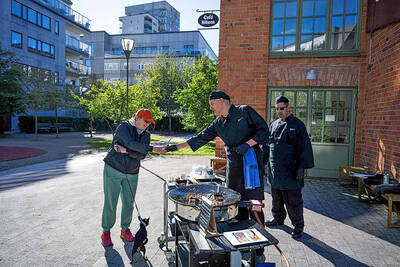Hopes dimmed for an agreement from the UN Security Council over the future of Kosovo, with Western diplomats saying negotiations were deadlocked and talks would continue in European capitals.
The council's 15 members met behind closed doors Wednesday to hear from Vojislav Kostunica, the Serbian prime minister, and Fatmir Sejdiu, the president of Kosovo.
Kostunica insisted that Kosovo, a province of Serbia that is 90 percent ethnic Albanian, should remain part of its territory. Sejdiu laid out the Kosovars' demands for quickly gaining independence, a move that would be backed by the US and key European nations.
Kostunica said the country will not recognize any declaration of independence by Kosovo.
"Will for the first time in the UN's history a decision be taken -- contrary to the will of a democratic state and, what is more, of a UN founding member -- to redraw its internationally recognized borders, to abolish its sovereignty and to amputate 15 percent of its territory?" he said in prepared remarks.
But the Kosovars say they are ready to become independent.
"We are exhausted after nearly two decades of isolation, war and political limbo," Sejdiu said. "Lack of clarity about our status has held back our economy, discouraged international investment and prevented us from accessing international financial institution lending."
British Ambassador John Sauers said afterward that the meeting "underlined just how enormous the gulf is between the two parties," and he described the current situation in Kovoso as "unsustainable."
While Russians and their close Serbian allies contended any action outside the council would be illegal, Sauers and US Ambassador Zalmay Khalilzad insisted the 1999 UN resolution providing for Kosovo to be administered by the UN and NATO troops also contains the legal basis to move ahead with independence.
The US and Europeans insisted the issue of Kosovo's future status is unique, and would not set a precedent for other separatists groups as Russia and Serbia claim.
Khalilzad declared the views of the two sides "irreconcilable," and he said it was time for an independent Kosovo.
"The continuation of the status quo poses not only a threat to peace and stability in Kosovo but also to the region and in Europe," he said.
Although Kosovo formally remains part of Serbia, the southern province has been run by the UN and NATO since 1999, when the Western military alliance ended former Yugoslav leader Slobodan Milosevic's crackdown on ethnic Albanian separatists. Sauers recalled that the deportation of ethnic Albanians in the 1990s was the worst since World War II.
Italian Foreign Minister Massimo D'Alema, whose country holds the Security Council presidency, confirmed the 15 members "did not reach any specific conclusions." But he said the council called on the parties "to maintain peace and refrain from actions that might jeopardize the security situation in the region," as they have both promised.
Wednesday's meeting focused on a recent report by US, EU and Russian mediators on two years of talks between Belgrade and Kosovo on the province's status. A four-month extension of the talks ended last month without agreement.
However, Russia said those talks yielded some progress and it called for further UN-sponsored negotiations on autonomy for the province. Russian Ambassador Vitaly Churkin insisted there would be more UN talks on Kosovo.
Calling himself an optimist, Churkin said Russia believes "that negotiations can continue and they can produce an outcome which will be acceptable for the two parties and which would keep stability in Kosovo and in the Balkans."
Assuming Russia again blocks action in the Security Council, the Kosovo issue will move to the EU. In that event, Sauers said, the EU will push for internationally supervised statehood for Kosovo under a plan drawn up by a UN envoy earlier this year.

READINESS: According to a survey of 2,000 people, 86 percent of Swedes believe the country is worth defending in the event of a military attack Swedes are stocking up on food items in case of war, as more conflict in Europe no longer feels like a distant possibility, and authorities encourage measures to boost readiness. At a civil preparedness fair in southwest Stockholm, 71-year-old Sirkka Petrykowska said that she is taking the prospect of hostilities seriously and preparing as much as she can. “I have bought a camping stove. I have taken a course on preservation in an old-fashioned way, where you can preserve vegetables, meat and fruit that lasts for 30 years without a refrigerator,” Petrykowska said. “I’ve set aside blankets for warmth, I

FRUSTRATIONS: One in seven youths in China and Indonesia are unemployed, and many in the region are stuck in low-productivity jobs, the World Bank said Young people across Asia are struggling to find good jobs, with many stuck in low-productivity work that the World Bank said could strain social stability as frustrations fuel a global wave of youth-led protests. The bank highlighted a persistent gap between younger and more experienced workers across several Asian economies in a regional economic update released yesterday, noting that one in seven young people in China and Indonesia are unemployed. The share of people now vulnerable to falling into poverty is now larger than the middle class in most countries, it said. “The employment rate is generally high, but the young struggle to

ENERGY SHIFT: A report by Ember suggests it is possible for the world to wean off polluting sources of power, such as coal and gas, even as demand for electricity surges Worldwide solar and wind power generation has outpaced electricity demand this year, and for the first time on record, renewable energies combined generated more power than coal, a new analysis said. Global solar generation grew by a record 31 percent in the first half of the year, while wind generation grew 7.7 percent, according to the report by the energy think tank Ember, which was released after midnight yesterday. Solar and wind generation combined grew by more than 400 terawatt hours, which was more than the increase in overall global demand during the same period, it said. The findings suggest it is

‘ARMED CONFLICT’: At least 21 people have died in such US attacks, while experts say the summary killings are illegal even if they target confirmed narcotics traffickers US forces on Friday carried out a strike on an alleged drug-smuggling boat off the coast of Venezuela, killing four people, US Secretary of Defense Pete Hegseth said. The latest strike, which Hegseth announced in a post on X, brings the number of such US attacks to at least four, leaving at least 21 people dead. An accompanying video shared by Hegseth showed a boat speeding across the waves before being engulfed in smoke and flames. “Four male narco-terrorists aboard the vessel were killed,” the Pentagon chief wrote. He said the strike “was conducted in international waters just off the